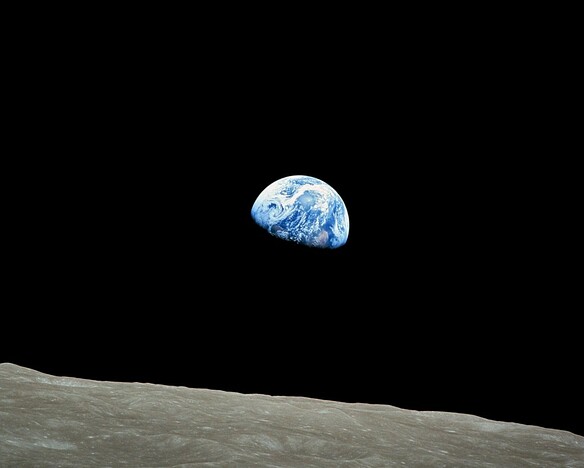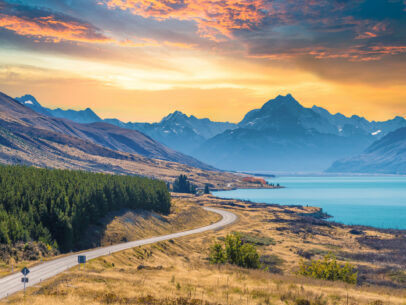
The Bird’s Word Blog
Earth Day Everyday

Journeys Co-Founder and Director Dr. Will Weber discusses the problematic state of the planet — and how travel can be part of the solution.
Earth Day, April 22, is now being celebrated for the 44th time. But really, every day is Earth Day in the sense that the wonders of our earthly environment are consistently sustaining to our lives. Yet even as we appreciate Earth, our human use of the home planet has caused the fraying of the ecosystem.
As one of the organizers of the first Earth Day events in 1970, I recall the extraordinary power of realization that motivated our efforts. For the first time in a systematic way we were celebrating that it is incredible to exist at all on this precious, temperate, coincidentally water-, oxygen-, and carbon-rich blue planet adrift in a vast universe hostile to living things. We cannot take the purity of the air, water, and food for granted or as immutable and inexhaustible. Our tiny planet is finite and fragile. Astronauts could now circle it in 90 minutes. Nuclear testing in the atmosphere over the Pacific left residues in cow’s milk in Wisconsin. DDT meant to kill noxious insects was killing millions of birds, including the Bald Eagle, and rendering fish in the Great Lakes and elsewhere unfit for human consumption to this day.
Today, because we failed to take our Earth Day-1970 realizations seriously enough, life on earth is increasingly imperiled. Climate change, desertification, a vastly expanding human population and diminishing supply of fresh water predict increased human suffering, an escalating rate of species extinction and a greater frequency of catastrophic weather events.
And even as the evidence of our failed stewardship of the planet should heighten our awareness of incipient planetary disaster, too many voices deny the facts of our circumstance and seek to escalate the destruction through de-regulating pollutants, repealing environmental laws, encouraging human population expansion and treating rapid climate change as inevitable and even positive.
What are the implications for travelers?
When we started Journeys, the fragility of the earth was foremost in our minds. Then, as now, we believed that international travel can help us appreciate the limits of consumption and materialism. By appreciating other cultures which find fulfillment and happiness with less environmental impact, we can reduce our own footprint in and on the environment. By promoting the idea of cross-cultural friendships, we feel cooperation can replace competition and compassionate understanding can become a more adaptive strategy than striving for economic dominance and superiority.
Travel allows us to see for ourselves the linked consequences of unrestricted population growth, environmental destruction and global climate change. In my four-and-a-half decades of world travel since the first Earth Day, I have seen the glaciers on Kilimanjaro melt to near disappearance. I have seen the forests and rivers of Nepal deteriorate so extensively the country has been unable to realize it’s imagined wealth of timber and hydroelectric potential. There is less reliable and consistent electricity in Nepal’s cities now than when I was a Peace Corps Volunteer there in the early 1970’s. In just the past two decades, most of China’s rivers have become too polluted to support fish and in many cases are completely dry or diverted. The Amazon is decreasingly still the largest terrestrial “carbon sink” on the planet. When you fly over the Amazon you realize it is still vast, but diminishing. The North Pole is likely to be increasingly free of ice in future summers and most years you can now visit the Pole by exploration cruise ship.
Travel verifies for us that humans are not only the most powerful and ubiquitous organisms of environmental destruction, but the most consumptive and adaptive as well. We might believe that climate change is the Earth’s way of fighting back. But as a species we are almost infinitely adaptable and immune to environmental restraint. If we can live in outer space, survive winter at the South Pole, explore the deepest oceans in submersible vehicles, climb the highest peaks without oxygen and translocate ourselves between continents in a matter of hours, it is clear human life is not at risk. We are an endangering species as we continue to occupy and colonize literally every habitat on earth.
Unfortunately, we have not found the adaptive balance between what is possible and what is sustainably appropriate. We can produce unlimited energy, but we have not learned to control the consequences. We can manufacture extraordinary products but not manage the externalities of production. We can push agriculture into every habitat and environment but we do not recognize the high price we pay in the loss of species diversity and ecosystem services.
Travel provides a bigger picture of our small planet in peril at a local scale. Earth Day gave us that blue marble image of our life-rich planet in a hostile universe. International travel allows a microscopic but globally ranging view of our circumstance and reveals that all is not well on a vast scale. At best, travel also identifies individuals, groups and institutions who share concern for the local problems and solutions to problems replicated on a global scale.
Travel to anywhere on earth is an extraordinary privilege available to many more of us than was possible even a few decades ago — and available to no one a century ago. Our responsibility as travelers is to observe the details of this massive calculus of environmental change. We must use this knowledge to support efforts to reduce carbon emissions and resist weakening of environmental regulations that slow the poisoning of air, land, and water. And finally, we must sympathize not just with people and cultures, but the billions of organisms unable to adapt, move, think ahead or change lifestyles as we humans are so capable of doing.

Design an adventure with Journeys International!
With over 40 years of experience, we create experiences that match your goals.
Start Planning

